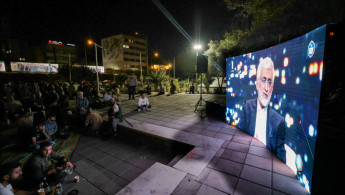Fourth Iranian presidential debate sees foreign policy discussed ahead of Friday vote
Iran's presidential candidates discussed the country's foreign policy Monday in a three-hour live debate, promising to seek better relations with other nations and work to have sanctions on their country lifted.
The televised debate was the fourth in a series of five ahead of Friday's election, which follows a helicopter crash last month that killed Iranian President Ebrahim Raisi and seven others. The final debate will be Tuesday.
All the candidates pledged to try to have Western sanctions on Iran lifted, but they expressed different attitudes about the issue.
"We will definitely negotiate and reach an agreement" to revive a nuclear deal with world powers that President Donald Trump pulled the US out of in 2018, said Mohamad Bagher Qalibaf, the hardline pragmatic parliament speaker, who is seen as a prominent candidate.
However, he said that under his presidency Iran would choose a gradual policy, "taking step in return to step" that the other side would take in lifting sanctions.
Saeed Jalili, a hardline contender and former nuclear negotiator, said: "We should make the enemy regretful from sanctioning Iran through economic means." He proposed seeking better economic ties with Latin America and African nation to defuse the sanctions.
Masoud Pezeshkian, a reformist who is a member of parliament, said, "We have to resolve our problems with the world, we have to resolve issues" about the nuclear deal.
Without naming any nation, Pezeshkian also said he as a president, he would "not tolerate occupation and genocide," a reference to Israel and its war on Gaza.
The three other candidates, all hard-liners, also promised to pursue lifting sanctions. One of those, Amir Hossein Qazizadeh Hashemi, a current vice president, said that if Trump wins the US presidential election, "We can negotiate with Trump and impose our demands on him."
The hardline candidates blamed Iran's isolation and trouble in foreign relations on the administration of former relatively moderate President Hassan Rouhani, who reached the nuclear deal with world powers in 2015. Many close allies and associates of Rouhani support Pezeshkian.
Supreme Leader Ayatollah Ali Khamenei has final say on all important state matters, including nuclear negotiations and foreign policy.
All the candidates promised better relations with neighboring nations and they urged Iranians to turn out for the election.
Raisi won Iran's 2021 presidential election in a vote that saw the lowest turnout in the Islamic Republic's history.
This week's election coincides with heightened tensions with the West over Tehran's rapidly advancing nuclear program, its arming of Russia in that country's war in Ukraine and Iran's wide-reaching crackdowns on dissent.
Iran's support for militia proxy forces throughout the wider Middle East, meanwhile, has been increasingly in the spotlight as the Iranian-backed Houthi rebels in Yemen attack ships in the Red Sea in response to the Israel's war on Gaza.





 Follow the Middle East's top stories in English at The New Arab on Google News
Follow the Middle East's top stories in English at The New Arab on Google News


